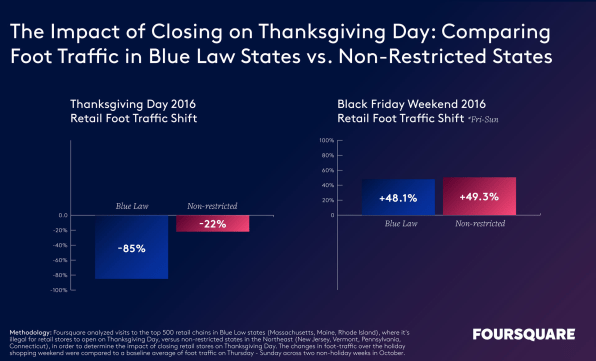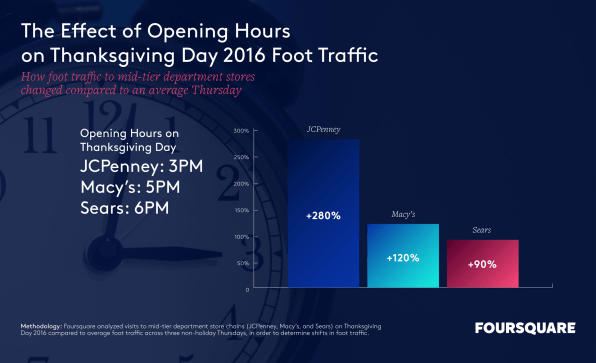Recently, stores have made a point of keeping their doors shut on Thanksgiving–and even Black Friday–to encourage their employees and customers to spend time with their families. But taking the moral high ground comes at a cost, according to Foursquare, which gathers location data of about 50 million monthly global users of its apps and mines it for ad-targeting and other business insights.

Foursquare compared shopping patterns in states where there are so-called “blue laws” against department stores opening on Thanksgiving Day–Massachusetts and Rhode Island–to states that are allowed to open on Thanksgiving. It found that in places where department stores were forced to close for the day, there was a full 85% decrease in retail foot traffic compared to a regular Thursday, with consumers only visiting non-department stores like pharmacies and gas stations. Meanwhile, in states with no restrictions, Thanksgiving Day retail traffic only dropped by 22% compared to a regular Thursday.
In other words, when stores are open on Thanksgiving, the majority of the population will take the opportunity to shop at them.

It also studied department stores that open at different times on Thanksgiving Day. It found that stores that open earlier drive more visits, and steal significant market share from their competitors, who never recover the volume. JC Penney, which opened at 3 p.m., made 280% more on Thanksgiving than it did on a regular day. Sears, which opened at 6 p.m., made only 90%, which would suggest that customers were choosing to go to department stores that opened earlier. (See a list of store openings and closings on Thanksgiving at Best Black Friday.)
That said, data from GPShopper, which tracks online traffic, shows that consumers are increasingly choosing to do their holiday shopping online, and many prefer to do it outside the narrow Thanksgiving and Black Friday period. So while consumers still take advantage of open stores during Thanksgiving, the sheer volume of shoppers physically going shopping continues to slide downward.
Related: Walmart owns Black Friday, but Amazon owns Cyber Monday even moreES
Fast Company , Read Full Story
(26)